Fatima Rushdi (1908-1996) was an Egyptian actress, singer, film director, and producer who was one of the pioneers of Egyptian cinema. [1]
Fatima Rushdi (1908-1996) was an Egyptian actress, singer, film director, and producer who was one of the pioneers of Egyptian cinema. [1]
Born in Alexandria, Fatima Rushdi moved to Cairo at 14 to become an actress. [2] Without any formal training, and speaking only Egyptian Arabic, [3] she started her own theatrical troupe in 1926 [4] and travelled throughout North Africa. Theater director Aziz Eid fell in love with her and enabled her to learn to read and write. [2] She became known as the "Sarah Bernhardt of the Orient" for reprising many of Sarah Bernhardt's famous roles, including Mark Anthony in Julius Caesar. [1]
In the late 1920s, Rushdi went on acting tours abroad. She acted in Beirut, Jaffa, Haifa, Latakia, Baghdad, and in Tunisia and Algeria. She also sailed to South America and acted in Santos, São Paolo, Rio de Janeiro, and Buenos Aires. [5]

Her first film appearance was in Ibrahim Lama's Faji`a Fawq Al-Haram in 1928. [1] In 1933, she directed her first and only film, al-Zawaj, which premiered in Paris. [2] No surviving copies are known, and in her 1970 memoir, she claimed to have burned the completed film. [2] In the film, she starred as a woman pushed into an unhappy marriage by her father who dies tragically at the end. She acted in several films by Kamal Selim, including the realist film The Will al-`Azima (1939), where she played a young working-class girl falling in love with the neighbour's son.

Her last screen appearance was in 1955, in a secondary role in Ahmed Diaa Eddine's Da`uni A`ish / Let Me Live. [1] In the 1960s, Rushdi and Hussien Pasha Ghannam hosted a salon for filmmakers and students at the Cairo Higher Institute for Drama Studies. [2]
Rushdi retired from acting in the late 1960s. The limelight receded from her with age and the loss of health and wealth. She was living in her last days in a room in one of the hotels in downtown Cairo, until the Egyptian newspaper Al-Wafd revealed her miserable life, and Farid Shawqi intervened with the Government to provide her with health insurance and provide adequate housing. And that actually happened. She got an apartment, but fate did not give her time to enjoy what the state offered her. She died alone, leaving behind a huge legacy of more than 200 plays and 16 films, and a life she lived long and wide during which she lived with a generation of theater giants and moviegoers. She died on January 23, 1996, corresponding to Ramadan 3, 1416 AH, at the age of 87 years. [6] [7]
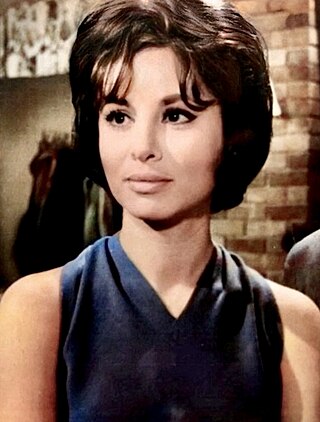
Faten Ahmed Hamama was an Egyptian film and television actress and film producer. She was the first wife of Ezz El-Dine Zulficar. She made her screen debut in 1939, when she was only seven years old. Her earliest roles were minor, but her activity and gradual success helped to establish her as a distinguished Egyptian actress. Later revered as an icon in Egyptian cinema. In 1996, nine of the films she starred in were included in the Top hundred films in the history of Egyptian cinema by the cinema critics of Cairo International Film Festival.

Fatma Ahmad Kamal Shaker, better known by her stage name Shadia, was an Egyptian actress and singer. She was the third wife of Salah Zulfikar. She was famous for her roles in light comedies and drama in the 1950s and 1960s. Shadia was one of the iconic actresses and singers in Egypt and the Middle East region and a symbol of the golden age of Egyptian cinema and is known of her many patriotic songs. Her movies and songs are popular in Egypt and all the Arab world. Critics consider her the most successful comprehensive Egyptian and Arabic artist of all time. Her first appearance in a film was in "Azhar wa Ashwak", and her last film was "La Tas'alni Man Ana".

Youssef Abdallah Wahbi Qotb was an Egyptian stage, film actor and director, a leading star of the 1930s and 1940s and one of the most prominent Egyptian stage actors of all time, who also served on the jury of the Cannes Film Festival in 1946. He was born to a high state official in Egypt but renounced his family's wealth and traveled to Rome in the 1920s to study theatre. Besides his stage work, he acted in around 50 films in Egyptian cinema, starting with Awlad al-Zawat to "Iskanderiya... lih?".

Ezz El-Dine Ahmed Mourad Zulficar was an Egyptian film director, screenwriter, actor and producer known for his distinctive style, which blends romance and action. Zulficar is widely regarded one of the most influential filmmakers in Egyptian Cinema's golden age.

The cinema of Egypt refers to the flourishing film industry based in Cairo, sometimes also referred to as Hollywood of the East or Hollywood on the Nile. Since 1976, the capital has held the annual Cairo International Film Festival, which has been accredited by the FIAPF. There are an additional 12 festivals. Of the more than 4,000 short and feature-length films made in MENA region since 1908, more than three-quarters were Egyptian films. Egyptian films are typically spoken in the Egyptian Arabic dialect.
Suad Nasr Abd El Aziz was an Egyptian theatre, television, and film actress. She was born in Shubra, Cairo, Egypt. Her fame increased for her role as the character "Maisa", whom she played in the TV series Wanees's Diary, in its first five parts, which began in 1994.
Arab cinema or Arabic cinema refers to the film industry of the Arab world. Most productions are from the Egyptian cinema.

Nelly Artin Kalfayan, better known by only her mononym Nelly, is an Egyptian actress, singer, comedian, dancer, television personality, and all-around entertainer.
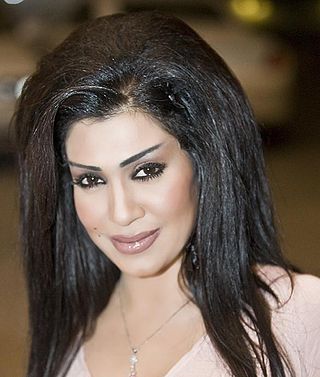
Fatima Abdul Raheem is a Bahraini actress.

Fatma Al-Yusef, also known as Roz Al-Yosef, was a Lebanese born journalist and stage-actress, a pioneer of Arab female journalism and a patron of the Arab female press. She is considered the Arab world's first woman journalist.
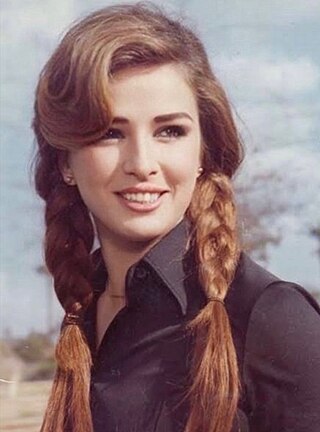
Naglaa Fathi aka Nagla' Fathi, whose birth name is Fatmah Elzahra' Hesin Fathi, Nagla' Fathi, is an Egyptian actress. She started her acting career in 1967 and has played a role in over 80 films. She established a production company and produced films, including film : Supermarket (1990) in which she was actress also. The award-winning actress also wrote the screenplay for Tomorrow I Will Take Revenge, (1980).

Bahiga Hafez was an Egyptian screenwriter, composer, director, editor, producer and actress.
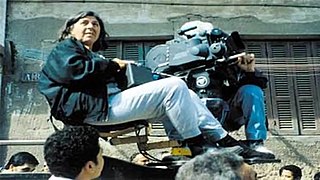
Asma El Bakry was an Egyptian film director, author and illustrator. She was born in Cairo, moving to Alexandria as a young girl with her mother and brother. She attended the renowned French school, Notre Dame de Sion and Lycée, and earned a BA in French literature from the University of Alexandria in 1970.
Ashiaa la toshtra is an Egyptian film released in 1970. It was written by Amin Youssef Ghorab, directed by Ahmed Diaa Eddine, and produced by the Egyptian General Film Organization. The film stars Nour El-Sherif, Shams al-Baroudi, and Yehia Chahine.

Appointment at the Tower is a 1962 Egyptian film written and directed by Ezz El-Dine Zulficar. It stars Salah Zulfikar, Soad Hosny and Fouad el-Mohandes.
Furigat is an Egyptian film released on July 2, 1951. The film is directed by Hussein Fawzi, features a screenplay by Abo El Seoud El Ebiary, and stars Naima Akef, Mohsen Sarhan, Abbas Fares, and Hassan Fayek. The plot revolves around a belly dancer named Sett al-Kul who dreams of fame and money fronting a traveling music group. She sees her opportunity when her father returns a wealthy woman's lost purse, whereupon she offers to perform in the grandee's band.

Laila Taher born Sherouette Moustafa Ibrahim is an Egyptian film, stage, television actress and presenter who is mostly known for her successful collaborations with Salah Zulfikar in film, television and theater. She participated in over hundred artworks through her career mostly in television. In films, Laila Taher is known for her notable roles in; Saladin the Victorious (1963), Soft Hands (1963), A Husband on Vacation (1964),The Peacock (1982) and Monsieur le Directeur (1988).

A Husband on Vacation also known as A Husband on Holiday is a 1964 Egyptian romantic comedy film starring Salah Zulfikar and Laila Taher. The film is written by Rashad Hegazi and directed by Mohamed Abdel Gawad.
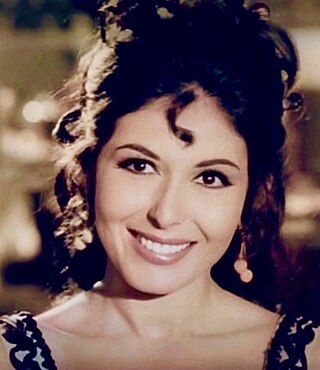
Magda El-Khatib is an Egyptian film, stage, television actress and film producer. She participated in over hundred artworks through her career. She was notable for her roles in the golden age of Egyptian cinema.
{{cite book}}: CS1 maint: date and year (link)